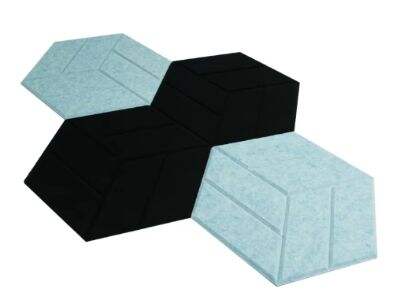Når det gælder forbedring af lyden i et rum, har du sikkert hørt om to populære metoder: akustiske diffusorer og absorberende paneler. De spiller begge deres rolle, men gør det på forskellige måder. Læs videre for at finde ud af, hvilken der måske er den rigtige til din opsætning for at opnå den perfekte lydbalance. Og husk, uanset om du planlægger at installere et hjemmebiograf, opsætte et musikstudie eller blot minimere støj i et rum, kan kendskab til grundlæggende viden om disse værktøjer betyde alt.
De er lydisolerende, ligesom akustiske diffusorer og absorberere, som hver har deres superkraft. Absorberere er stoffer, der absorberer lydbølger og derved formindsker støj og ekko. De er fremragende til at gøre rum mere stille. JIANG FEN BEI akustiske diffusionspaneler spred lydbølgerne i alle retninger i rummet. Det hjælper med at gøre lyden i et rum mere afbalanceret og naturlig, især i rum, hvor der spilles eller optages musik. Så hvis dit rum har en lidt ekkoende klang, eller hvis det er svært at forstå, hvad folk siger, kan en absorberer være det rigtige produkt at prøve. Hvis lyden virker død og uden dimensioner, kan en diffusorer give den mere liv.
Vælg den rigtige modstand for at opnå den bedste lydbalance i rummet
At beslutte, om du skal behandle dit rum med en diffuser eller en absorber, er ikke lige så enkel en beslutning, som man måske skulle tro. Overvej, hvordan du typisk bruger det pågældende rum. Hvis du optager musik eller spiller instrumenter, vil du have lyden tydelig og levende, og her kommer diffusere ind i billedet. På den anden side, hvis du ønsker at skabe et fredfyldt studierum eller hjembiograf, kan absorberer være mere nyttige til at holde støj og ekko ude. Desuden kan den bedste løsning for dig måske være en kombination af både diffusere og absorberer for at sikre den klarhed og stilhed, du søger.
En sammenligning mellem fordele og ulemper ved akustiske diffusere og absorberer
Akustiske diffusorer er fremragende til at bevare lydens energi i et rum uden at skabe ekko. De hjælper med at holde rummet levende og forhindre, at lyden bliver for overvældende. Men de formindsker ikke den samlede støj. Absorberer er effektive til dæmpning af lyd, men kan ofte gøre et rum for dødt, hvis de anvendes i for store mængder. Det handler om at finde den rette balance ud fra dine behov. Hos JIANG FEN BEI foreslår vi, at du vurderer rummets størrelse og dens primære funktion, inden du træffer valg. akustikdiffusorpanel tager centrum.
Få deres projektstudie/værelse til ikke at lyde som et projektstudie/værelse på grund af den optimale præference ved valg af akustisk behandling.
Nøglen til akustik er at opnå den perfekte blanding mellem absorption og diffusion. Du søger ikke et rum, der enten er for ekko-fuldt eller for dæmpet, men ét, der er lige præcis rigtigt. Start med én løsning – måske ved at tilføje nogle lydabsorberende elementer, hvis støj er dit største problem. Tag derefter et skridt tilbage og lyt. Hvis rummet begynder at føles for dæmpet, kan du overveje at tilføje en diffuser for at få lidt liv tilbage i lyden. Det er ligesom at krydre en ret; nogle gange har du bare brug for lidt mere salt eller en knivspids peber for at gøre det perfekt.
Hvilken vil give bedre lydkvalitet til dit rum?
Det kan nogle gange være sjovt at finde ud af den bedste måde at forbedre lydkvaliteten på, ligesom at løse en gåde. Hvis dit rum er for ekko-fuldt, start med absorber. Hvis det lyder for træt, så prøv en diffuser. Husk, at formålet er at skabe et rum, der fungerer til enhver form for brug, uanset om det er til at se film, optage musik, eller blot have et stille sted at læse. Du er velkommen til at flytte JIANG FEN BEI akustisk lyddiffusorpanel rundt i rummet og placer den, hvor det lyder bedst, indtil du finder den rigtige placering. Om det lykkes, har sandsynligvis meget at gøre med det pågældende rum; ingen to rum er jo ens, og ingen to lyde er skabt lige.
Indholdsfortegnelse
- Vælg den rigtige modstand for at opnå den bedste lydbalance i rummet
- En sammenligning mellem fordele og ulemper ved akustiske diffusere og absorberer
- Få deres projektstudie/værelse til ikke at lyde som et projektstudie/værelse på grund af den optimale præference ved valg af akustisk behandling.
- Hvilken vil give bedre lydkvalitet til dit rum?

